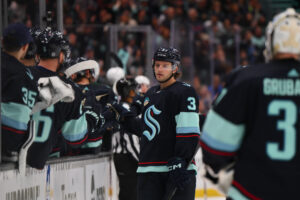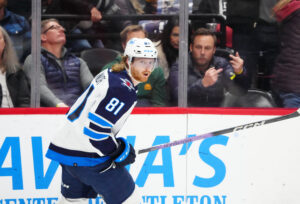Welcome back to Last Word on Hockey’s summer series where we look at the biggest game in team history. Each day we will be back with a new team to look at. Looking at things like the lead-up, what happened, followed, and why it makes it the biggest game. The biggest game does not automatically mean a win, either. Sometimes, it can be a loss that set the franchise back massively. Sit back and enjoy as we break down all 31 teams’ most important game. In this article, we will discuss the Philadelphia Flyers biggest game in franchise history. The full series is found here.
Philadelphia Flyers Biggest Game
Since the Philadelphia Flyers began play in 1967, they have provided a slew of memorable, important, and big games to the NHL. Although their two Stanley Cups hardly compare to teams like the Toronto Maple Leafs and the Montreal Canadiens, the Flyers have an impressive history. From the early days of the Broad Street Bullies to a record-setting six-game series win over the rival Pittsburgh Penguins in 2012, the Flyers have seen highs and lows across all of their big games. The Philadelphia Flyers biggest game in franchise history came during the 1974 Stanley Cup Finals against the Boston Bruins. A hard-fought, Game 6 home victory that earned the young franchise their first Stanley Cup.
The Broad Street Bullies are Born
The NHL added six new teams to the league in 1967 and imposed restrictive expansion draft rules designed to keep major talent in the original six. These rules severely impacted the new franchises, and the Flyers were no exception. Despite selecting goaltender Bernie Parent, the team struggled for the majority of their early history. The NHL placed all six of the new franchises in the same division. This allowed the Flyers to make the playoffs with a sub-.500 record twice. Both times, they lost to the St. Louis Blues.
Following the second series loss to St. Louis, which was a four-game sweep, the Flyers changed course forever. The Flyers majority owner Ed Snider did not want to see his team get out-muscled again. He instructed general manager Bud Poile to draft bigger, tougher players. That mandate was the genesis of what would become one of the most feared teams in the NHL. In 1969, the Flyers drafted Bobby Clarke and Dave Schultz.
Team Identity
The Philadelphia Flyers came into their own during 1972-73 season. The magic hands of Bobby Clarke and the tough, physical style of the Flyers turned them into a threat. Clarke became the then-youngest captain in NHL history that season and Rick MacLeish became the first Flyer to score 50 goals in a season. The play that earned the team the nickname “the Broad Street Bullies” from Philadelphia media made them a feared force around the league, and lead the franchise to its first winning season.
The question remained – would the Flyers style lead to the post-season success that continued to elude them? The answer was yes. The Flyers earned their first-ever playoff series victory over the Minnesota North Stars in the 1973 Stanley Cup Playoffs, taking six games to finish the job. Though the Flyers lost to the dominant Canadiens in the next round, the team proved it had what it takes to win no matter what time of year it was. Bobby Clarke capped off the season with a Hart Memorial Trophy win, being named as the league’s most valuable player.
Flyers Biggest Game – The Season
The 1973-74 season started with a bang. Original Flyer Bernie Parent returned to the franchise, giving the Broad Street Bullies an elite goaltender. The Flyers proved they were more than a flash in the pan and could compete with the very best of the NHL regularly. The tough got tougher as Dave Schultz finished the year with an astounding 348 penalty minutes. Clarke, MacLeish, and Bill Barber each scored over 30 goals, and the team finished the season atop the West Division with a record of 50–16–12. Parent’s returned proved crucial to the Flyers success. The netminder finished the season with 47 wins – a record that would stand for 33 years. Parent’s success in the net lead to a shared Vezina Trophy with Chicago Black Hawks goaltender Tony Esposito.
The 1974 Stanley Cup Playoffs started relatively easily for the Flyers. They swept the Atlanta Flames, only giving up five goals across the short four-game series. Their next opponent, the New York Rangers, proved to be a considerably more difficult task. The home team never lost in this hard-fought seven-game series. The Flyers regular-season success paid off, allowing them to close the Rangers out on home ice, and to once again make history. The Rangers defeat at the hands of Philadelphia was the first time an expansion team beat an original six team in the playoffs.
Flyers Biggest Game – The Finals
The Flyers would face another original six team in the Stanley Cup Final – the Boston Bruins. Although the Flyers could impose their will on most of the NHL at the time, the Bruins would not back down to the physical challenge. Over the two team’s previous 19 meetings in Boston, the Flyers lost 17 and tied two of those games. The Bruins home-ice advantage made them heavy favourites to win the 1974 Stanley Cup Finals.
Game 1 was tied at two goals apiece down into the final minutes. The Flyers had a chance to put the game away with a shot into a wide-open Boston net, but Bruins legend Bobby Orr blocked the puck with his leg. Orr immediately skated the puck up the ice and fired a shot past Parent in the game’s final minute, winning the game. The Bruins nearly took a 2-0 lead on the series in Game 2, but a timely goal from Flyers defenceman Andre Dupont while the goalie was pulled tied the game at 2-2 late. Bobby Clarke scored in overtime, tying the series.
Parent’s stellar play in goal allowed the Flyers to win the next games. The heavy underdog whose style was under scrutiny held a 3-1 series lead heading into Game 5. The Bruins answered the call in Game 5. After two Orr goals, numerous fights and penalties, and a shaky performance from Parent, the series lead shrank to 3-2. Boston easily dispatched the Flyers by a score of 5-1, forcing a Game 6.
Game 6, 1974 Stanley Cup Finals
The Philadelphia Flyers biggest game in franchise history took place on May 19th, 1974. The rough and tumble Flyers came home to play Game 6 only one win away from their first-ever Stanley Cup. The sold-out crowd and the national audience on NBC watched Kate Smith perform God Bless America live, and the puck dropped. The Bruins outplayed the Flyers early on, ending the first period by doubling up the Flyers shot total, 16-8. Despite being outplayed early, MacLeish redirected a Dupont shot on the power play. The Flyers finished the period up 1-0.
The second period and most of the third saw more of the same. Shifting momentum, tough, physical play, and a peppering of shots from both sides. Game 6 went into the second intermission with only one goal on the board, and it remained that way deep into the third period.
A late Bruins push to for a goal that might lead to a Game 7 was stopped in its tracks at 17:38 of the third period. Orr dragged down Clarke on a breakaway, essentially making the Bruins shorthanded for the remainder of the game. Orr swears to this day his takedown was a legal hit. The Flyers closed the Bruins out in front of 17,000 fans in Philadelphia to win their first Stanley Cup. Parent’s 30 saves and MacLeish’s redirected goal were good for a final score of 1-0. The Flyers became the first non-original six team to win the Stanley Cup since the 1930s, and Parent was named playoff MVP. The Flyers proved their style of hockey could win championships. The Bullies went on to win again the very next year as they built a culture and identity around their team.
Main Photo:
Embed from Getty Images






